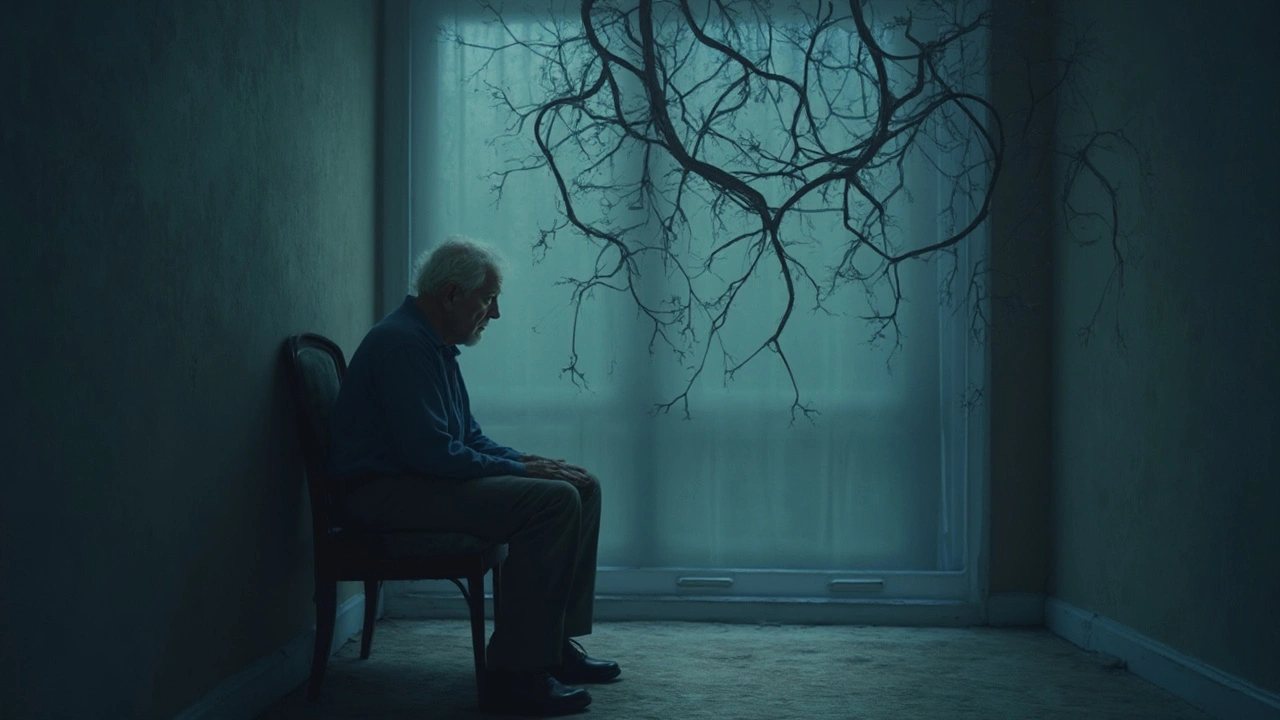Did you know that feeling lonely can do more than just make you sad? It's actually linked to a whole bunch of health issues, especially when it comes to your brain. Researchers have been digging into how loneliness might increase the risk of developing Alzheimer's disease. Sounds alarming, right?
Being alone or feeling isolated isn't just about not having enough people around. It's about how you experience those situations. And it's crucial when considering Alzheimer's. Individuals feeling lonely often experience faster cognitive decline. So, if you've got a loved one fighting Alzheimer's, tackling loneliness might be more important than you think!
But don't worry—there's hope. By building social connections and focusing on mental and emotional health, you can help reduce these risks. We'll dive into how loneliness intertwines with Alzheimer's and explore simple ways to combat it. Keep reading to find out more. Your brain will thank you!
- The Impact of Loneliness on Brain Health
- Why Isolation Worsens Alzheimer's
- Recognizing the Signs of Loneliness
- Strategies to Combat Loneliness
- Supporting Loved Ones Facing Both
The Impact of Loneliness on Brain Health
We’ve all felt lonely at some point, but did you know it goes beyond just feeling blue? Loneliness can seriously mess with your mental well-being and even your brain health. That's right—loneliness can have tangible effects on how our brains function.
Studies have shown that loneliness isn't just emotionally tough; it’s bad for your body and mind, too. When people experience prolonged loneliness, their stress levels shoot up. When stress stays high, it can cause inflammation, and inflammation is linked to a host of health issues, including the progression of Alzheimer's disease. In fact, people who are socially isolated are twice as likely to suffer from cognitive decline, which is a big risk factor for Alzheimer's.
How It Affects Memory and Learning
Loneliness is like a slow poison for the brain. It affects areas responsible for memory, learning, and decision-making. Scientists have even observed that socially isolated individuals may struggle more with memory tests and may not learn new things as quickly as those with robust social connections.
Why does this happen? Well, part of it is due to reduced brain stimulation. When you’re interacting with others, your brain is working overtime, processing conversations and picking up on social cues. When loneliness strikes, that part of the brain doesn’t get the workout it needs, leading to deterioration.
Brain Health by the Numbers
To put this into perspective, here’s a quick look at some numbers:
| Aspect | Impact on Lonely Individuals |
|---|---|
| Risk of Dementia | Increases by 40% |
| Memory Decline Speed | Faster than average by 20% |
| Alzheimer's Progression | Accelerates due to increased stress |
These numbers highlight just how important it is to stay socially connected for the sake of your brain health.
So, what can you do about it? It might be as simple as reaching out to a friend or joining a local club. Building these connections can help provide that brain stimulation your mind needs to stay sharp. It’s not only about feeling better emotionally but about keeping your brain in tip-top shape. Remember, a little socializing can go a long way!
Why Isolation Worsens Alzheimer's
Diving into how loneliness impacts Alzheimer's, it's clear that isolation is more than just an emotional state—it physically affects the brain. When someone is isolated, they're often missing out on essential mental stimulation. This lack of interaction can lead to faster cognitive decline. Picture it like a muscle that weakens without exercise.
Lack of Mental Stimulation
Our brains thrive on challenges and social interactions. When isolated, we're not engaging in conversations or problem-solving activities as much. This can lead to a drop in cognitive function, which is already a problem in Alzheimer's.
Research suggests that people engaged in regular social activities often maintain better cognitive functions, even as they age. So, loneliness can accelerate the symptoms of Alzheimer's, making it vital to stay connected.
Stress and Its Impact
Let's not forget stress. Being lonely can increase stress levels, and chronic stress is no friend to brain health. Stress hormones, like cortisol, can negatively impact memory and learning areas of the brain, complicating Alzheimer's symptoms.
Physical Health Takes a Hit
Don't think it's just the mind affected. Isolation often leads to less physical activity. And physical health is closely linked to brain health. Without exercise, there's a risk of decreased blood flow to the brain, which can speed up the decline.
The Vicious Cycle
Alzheimer's can push people into isolation, as they might withdraw due to embarrassment or frustration. It becomes a vicious cycle—loneliness worsens their condition, and the condition increases loneliness.
| Impact | Factor |
|---|---|
| Increased Cognitive Decline | Lack of Social Interaction |
| Higher Stress Levels | Lack of Emotional Support |
| Reduced Physical Activity | Isolation |
Understanding the connection between isolation and Alzheimer's is a wake-up call. It's a powerful reminder of how important community and social bonds are for mental well-being. By actively working against isolation, we can help manage Alzheimer's progression and improve life quality for our loved ones.

Recognizing the Signs of Loneliness
So, how do you really know if someone is lonely, especially when they don't come out and say it? People often think loneliness is just about being alone, but it's entirely possible to feel lonely in a crowded room. Here's what to keep an eye out for.
Changes in Behavior and Mood
One of the first things people notice is a change in behavior. If a once sociable person starts avoiding plans, it could be a red flag. Mood swings, irritation, and unexplained sadness are also clues. When you see these signs in someone, it might be time to have a conversation.
Lack of Social Engagement
A big signal of loneliness is withdrawing from social activities. If family or friends aren't reaching out or accepting invitations as they used to, they might be feeling cut off. It could be that they feel too anxious or tired to interact, which can worsen their sense of isolation.
Physical Symptoms
This one's surprising, but loneliness can mess with your body too. Frequent headaches, disturbed sleep, or even a noticeable lack of energy can be tied to being lonely. Our brains and bodies are more interconnected than you’d think, and mental well-being often shows up in tangible ways.
Increased Use of Technology
Another clue might be an increased reliance on technology to fill that void. Someone spending hours scrolling through social media or engaged online more than usual might be using it to compensate for a lack of real-world interaction. That's particularly true with older individuals who might not feel as comfortable reaching out face-to-face.
The key here is not to jump to conclusions but to stay observant. If these signs crop up, it might be worth a friendly check-in. Ask direct questions, offer a listening ear, and most importantly, make sure you maintain those vital social connections. They could make all the difference for someone tiptoeing the line between solitude and loneliness.
Strategies to Combat Loneliness
Feeling lonely is tough, but the good news is there are plenty of ways to tackle it. Strengthening your social connections not only lifts your spirits but also helps ward off potential cognitive issues related to Alzheimer's. Here are some solid strategies you can try:
1. Engage in Community Activities
Attending local events or joining clubs can boost your social life. Think about what activities you enjoy. Whether it's a book club, dance class, or volunteering, getting out there helps you meet new friends and break the cycle of isolation.
2. Use Technology Creatively
Modern tech is a lifeline for many. Video calls, social media, and online forums can keep you connected to loved ones and like-minded folks. If you're not sure how to use these tools, consider taking a tech class. Libraries and community centers often offer free or low-cost courses.
3. Establish a Routine
Routines provide structure, which is comforting and helps integrate social opportunities into your day. You could start your mornings with a walk with a neighbor or have a weekly coffee meet-up.
4. Set Up Support Networks
Your support network is key. Whether it's family, friends, or support groups, having people to talk to eases feelings of loneliness. Consider joining support groups specifically for Alzheimer's caregivers or people dealing with brain health concerns.
5. Practice Mindfulness and Meditation
Mental well-being is essential, so include some mindfulness in your routine. Meditation or simple breathing exercises can help reduce stress and the emotional toll of loneliness. Remember, a healthy mind is crucial for overall mental well-being and can even protect against Alzheimer's.
Combating loneliness isn't about making massive life changes all at once. Start small, pick a strategy that suits you best, and gradually build up from there. A happier, social life with steady emotional support can truly make a difference in your fight against loneliness.

Supporting Loved Ones Facing Both
Helping someone grapple with both Alzheimer's and loneliness is no easy task. It's a journey filled with ups and downs, but understanding the crossroads these two conditions meet can make a big difference.
Be Present and Listen
One of the simplest yet most impactful steps you can take is just being there. Your presence matters more than you might realize. Take time to listen—to their worries, stories, and even their silence. Often, just knowing they have someone who cares and listens can alleviate feelings of isolation.
Foster Social Activities
Encouraging social interaction is key. Plan small gatherings with family or friends who understand the situation. Even virtual meetups can break the loneliness. It’s all about creating moments of connection without overwhelming them.
Encourage Physical Activity
Physical activities can be a game-changer. Simple activities like short walks or gardening can boost mood and mental well-being. Exercise releases endorphins, which help combat loneliness and improve brain health. Make it a fun routine, and maybe even join them.
Focus on Positive Routines
Routines that bring joy and engage mentally can be incredibly beneficial. Whether it's a daily puzzle, reading together, or listening to music they love, familiar activities provide comfort and a sense of normalcy.
- Morning coffee rituals with chat
- Afternoon walk in the park
- Evening reading sessions
Professional Support
Sometimes, the best way to support is by involving professionals. Therapists specializing in dementia care or support groups can offer vital help. They not only support your loved one but provide you with strategies to better navigate caring for someone with Alzheimer's compounded by loneliness.
Strong brain health and mental well-being in Alzheimer's are intimately linked to addressing social needs. Adjusting and trying different strategies will offer both of you a chance to find what truly helps.

